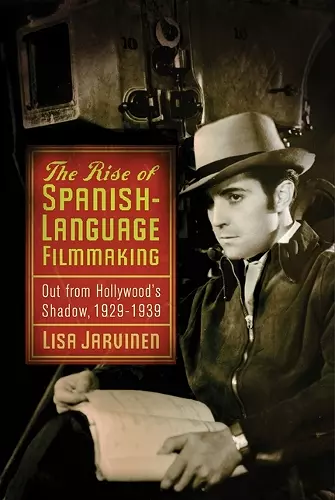The Rise of Spanish-Language Filmmaking
Out from Hollywood's Shadow, 1929-1939
Format:Hardback
Publisher:Rutgers University Press
Published:5th Jun '12
Currently unavailable, and unfortunately no date known when it will be back

Silent film was universally understood and could be exported anywhere. But when “talkies” arrived, the industry began experimenting with dubbing, subtitling, and dual track productions in more than one language. Where language fractured the European film market, for Spanish-speaking countries and communities, it created new opportunities. In The Rise of Spanish-Language Filmmaking, Lisa Jarvinen focuses specifically on how Hollywood lost ground in the lucrative international Spanish-speaking audience between 1929 and 1939.
Hollywood studios initially trained cadres of Spanish-speaking film professionals, created networks among them, and demonstrated the viability of a broadly conceived, transnational, Spanish-speaking film market in an attempt to forestall the competition from other national film industries. By the late 1930s, these efforts led to unintended consequences and helped to foster the growth of remarkably robust film industries in Mexico, Spain, and Argentina. Using studio records, Jarvinen examines the lasting effects of the transition to sound on both Hollywood practices and cultural politics in the Spanish-speaking world. She shows through case studies based on archival research in the United States, Spain, and Mexico how language, as a key marker of cultural identity, led to new expectations from audiences and new possibilities for film producers.
"Jarvinen has written a model piece of transnational history and she deserves applause for her smart, cogent examination of an important
yet little-known aspect of film history."
* Journal of American History *
"Transnational cultural history at its best! Jarvinen unearths struggles among racist Hollywood executives, nationalist Latin Americans, and cosmopolitan film crews as they forged a new market for Spanish-language films." -- Karin Alejandra Rosemblatt * University of Maryland, College Park *
"Jarvinen effectively and meticulously undermines common assumptions about Spanish-language films and the transition to sound in this compellingly argued analysis of a largely overlooked body of Hollywood production." -- Colin Gunckel * University of Michigan *
"Jarvinen effectively and meticulously undermines common assumptions about Spanish-language films and the transition to sound in this compellingly argued analysis of a largely overlooked body of Hollywood production." -- Colin Gunckel * University of Michigan *
"Transnational cultural history at its best! Jarvinen unearths struggles among racist Hollywood executives, nationalist Latin Americans, and cosmopolitan film crews as they forged a new market for Spanish-language films." -- Karin Alejandra Rosemblatt * University of Maryland, College Park *
"Jarvinen has written a model piece of transnational history and she deserves applause for her smart, cogent examination of an important
yet little-known aspect of film history."
* Journal of American History *
ISBN: 9780813552859
Dimensions: 229mm x 152mm x 18mm
Weight: unknown
230 pages